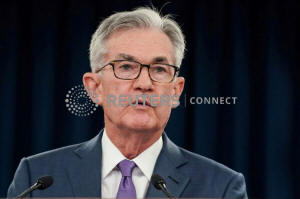Fed, trade confusion upending Wall Street investment playbooks
 Send a link to a friend
Send a link to a friend
 [August 02, 2019]
By David Randall [August 02, 2019]
By David Randall
NEW YORK (Reuters) - As Federal Reserve
Chair Jerome Powell on Wednesday described why the central bank's
interest rate cut should not be seen as the start of a lengthy easing
cycle, the U.S. stock market was losing value at a rate of over $25
billion a minute.
At issue was one of Wall Street's oldest play books: "Don't fight the
Fed." Investors have long taken cues to buy or sell equities from the
Fed's decisions to revive or cool the economy by adjusting short-term
interest rates.
Yet for the first time since the financial crisis, voting members of the
U.S. central bank appear to be at odds over their interpretation of
financial data and the Fed's responsibility to act, leaving investors
guessing as to what the Fed is basing future rate decisions on.
President Donald Trump, who has been lambasting Powell about not
lowering interest rates fast enough, unexpectedly announced an
additional 10% tariff on Chinese goods Thursday, possibly putting
additional pressure on the Fed to cut rates aggressively.

Powell has repeatedly said the central bank makes decisions
independently from markets and the White House. On Wednesday, he
described the widely-telegraphed 25 basis point rate cut as a “midcycle
adjustment” in response to signs of a global slowdown, simmering U.S.
trade tensions and a desire to boost too-low inflation, before leaving
the door open to additional cuts depending on future economic data.
During those 18 minutes of confusion, the benchmark S&P 500 plunged
1.75%, representing a market value loss of $461.7 billion, according to
Refinitiv data.
Two Fed members dissented from the Fed's rate cut, the first time since
at least 1998 the initial vote to lower rates in a cycle was not
unanimous. With the Fed split at a time of decades-low unemployment and
other signs the U.S. economy continues to expand, equity and
fixed-income fund managers say they are left with few clues to gauge the
next move from the world’s most powerful central bank.
"We've been trying to come up with historical analogies and we just
can't find one. This makes this market very unique and it's one of the
reasons why you had the muddled if not messy reaction to the Fed
decision," said Brian Jacobsen, senior investment strategist at Wells
Fargo Asset Management.
As a result, Jacobsen said he is focusing on higher-quality equities and
corporate bonds, rather than the companies with weaker balance sheets
that would typically benefit the most from a reduction in interest
rates.
BULLYING THE FED?
It was not Powell’s first run-in with markets.
In December, Powell effectively reiterated past Fed guidance when he
said the Fed's plan to trim bond holdings was on "autopilot." Still,
stocks sank on disappointment he did not indicate more flexibility.

Markets were also confused by remarks Powell made in October describing
rates as being a "long way" from neutral levels that neither stimulate
nor brake the economy, suggesting the possibility more rate hikes might
have been warranted. Fed officials ended up clarifying that rates were
nearing estimates of a neutral level.
[to top of second column]
|

Federal Reserve Chair Jerome Powell holds a news conference
following the Federal Reserve's two-day Federal Open Market
Committee Meeting in Washington, U.S., July 31, 2019. REUTERS/Sarah
Silbiger/File Photo

The New York Fed polls big investment firms on how well they are
communicating. In the most recent survey taken in early June, just
38% of respondents rated the Fed’s communications with markets and
the public as effective.
The market is now pricing in a 61.2% chance the Federal Reserve cuts
interest rates at its September meeting, and a greater than 70%
chance of a cut in either October or December, according to CME
Group.
Those high expectations of future rate cuts at a time when the Fed
is not clear as to its path could lead to a decline of 10% or more
in the S&P 500 in the next few months if the market is disappointed,
said Phil Orlando, chief equity strategist at Federated Investors in
New York.
As a result, he has been reducing his overweight to U.S. stocks and
other risky assets in the short-term, though he expects the Fed will
bend to the market's wishes rather than the market taking its cues
from the central bank.
At the same time, President Donald Trump has been unusually
outspoken in his criticism of the Fed and his desire for several
interest rate cuts.
"In our view on the basis of data alone the Fed would have done
nothing," Orlando said. "But the question I can't answer is how much
did the market and the president get in their heads and force them
to change the course of policy."
Terri Spath, chief investment officer at Sierra Investment
Management, said Powell's poor job of defending the Fed's decision
in his press conference Wednesday contributed to the "complete state
of confusion" among investors.

"He did what was expected but the market was looking for more to go
on," she said. "I'm firmly in the camp that the Fed didn't need to
cut and this contributes to the sense that there's an unease over
the gains we've earned this year" in the stock market, she said.
The benchmark S&P 500 index is up more than 20 percent for the year
to date, largely due to expectations of a series of equity-friendly
interest rate cuts this year.
Even if the economic data does not suggest the need for more rate
cuts, the potential power of the markets to prod the Fed into
continuing on a stimulative easing path makes it more difficult for
active managers to invest on a fundamental basis, said Eddy Vartu, a
portfolio manager at Osterweis Capital Management.
"Now we're in a funny position that we are analyzing trade news and
ECB policy even more than we might have a month or two ago because
we have to think about what the Fed thinks the markets expect from
it," he said. "The market is getting its way and imposing its will."
(Reporting by David Randall; Editing by Jennifer Ablan and Chris
Reese)
[© 2019 Thomson Reuters. All rights
reserved.]
Copyright 2019 Reuters. All rights reserved. This material may not be published,
broadcast, rewritten or redistributed.
Thompson Reuters is solely responsible for this content. |